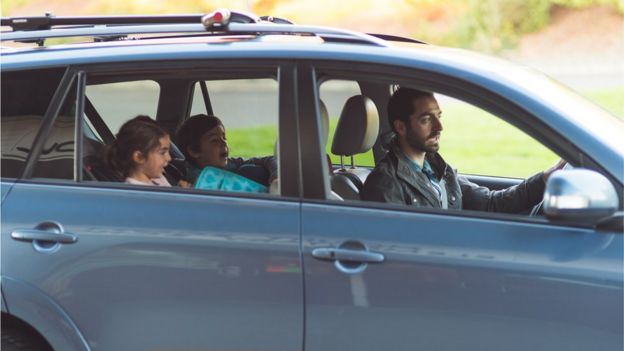Democratic presidential contender Kamala Harris has proposed new legislation to address a thorny parental problem - how to care for children whose school days end hours before the workday. Journalist Kara Voght explains why it sparked such a reaction and how this issue affects parents worldwide.
In the US, the average school day is roughly seven hours long, beginning just after 8:00 and ending around 15:00, a vestige of an earlier era when it was less likely that both parents worked outside the home.
Most schools begin their academic year in August and end it in June, with 180 schooldays in between. In the US, schools close for a two-day weekend and a handful of federal holidays, as well as an average of 29 addition days used for teachers' professional development, parent-teacher conferences, and additional vacation time.
These specifications don't neatly align with the work demands most American parents face.
Nearly 70% of parents with school-age children work a "9-to-5" schedule, and school closures during the year outpace what the average American has in holiday, vacation, and paid leave by nearly two weeks.
Since fewer than half of all elementary schools offer after-school care, most parents either have to pay for private caregivers - which costs an average of $6,600 (£5,100) per year - or scale back their working hours to make up the difference.
The professional sacrifice has typically fallen to mothers, a million of whom work less than full-time in order to provide caregiving responsibilities to elementary school-aged children.
Low-income mothers and mothers of colour, whose jobs often grant less flexibility and time off, often shoulder even greater burdens that ask them to choose between caring for their children or having a job at all.
 California Senator Kamala Harris has proposed keeping schools open longer to address care needs
Experts estimate that the United States loses $57bn in economic productivity each year thanks to the school calendar.
Harris' proposal aims to address this discrepancy. Her bill, called the Family Friendly Schools Act, is a pilot programme that would give 500 schools that serve a high proportion of low-income families up to $5m dollars in grants to develop programming for students from at least 8:00 to 18:00 Monday through Friday.
Schools would be expected to stay open every day of the school year except for weekends and federal holidays; if they want to close for any other reason, they need to provide a full day of enrichment activities for students.
The longer day wouldn't require more classroom time, however; Harris imagines that school districts would work alongside community partners to develop "high-quality, culturally relevant, linguistically accessible, developmentally appropriate academic, athletic, or enrichment opportunities for students".
In other words, this might be early, mid-day, or afternoon programming that looks more like after-school programmes that exist in some school districts now. Teachers and staff would not be expected to work more hours under Harris' vision; instead, the grant money would be used to hire additional staff or to pay teachers who volunteered to work more hours.
When the news of Harris' proposal went live, the backlash was swift, ferocious, and, surprisingly bipartisan.
Conservatives accused Harris of weakening the mandate of public education; National Review, a right-leaning magazine, took two swings at Harris' plan, asserting it would turn schools into daycare centres, destabilise community ties, and overexpose children to the exhausting social dynamics of their peers.
Liberals, meanwhile, criticised Harris for finding a solution to what they think is the wrong problem. The school day isn't too short, they argued - the work day is too long, and children shouldn't have to bear the brunt of capitalistic ambitions by staying at school for extra hours.
California Senator Kamala Harris has proposed keeping schools open longer to address care needs
Experts estimate that the United States loses $57bn in economic productivity each year thanks to the school calendar.
Harris' proposal aims to address this discrepancy. Her bill, called the Family Friendly Schools Act, is a pilot programme that would give 500 schools that serve a high proportion of low-income families up to $5m dollars in grants to develop programming for students from at least 8:00 to 18:00 Monday through Friday.
Schools would be expected to stay open every day of the school year except for weekends and federal holidays; if they want to close for any other reason, they need to provide a full day of enrichment activities for students.
The longer day wouldn't require more classroom time, however; Harris imagines that school districts would work alongside community partners to develop "high-quality, culturally relevant, linguistically accessible, developmentally appropriate academic, athletic, or enrichment opportunities for students".
In other words, this might be early, mid-day, or afternoon programming that looks more like after-school programmes that exist in some school districts now. Teachers and staff would not be expected to work more hours under Harris' vision; instead, the grant money would be used to hire additional staff or to pay teachers who volunteered to work more hours.
When the news of Harris' proposal went live, the backlash was swift, ferocious, and, surprisingly bipartisan.
Conservatives accused Harris of weakening the mandate of public education; National Review, a right-leaning magazine, took two swings at Harris' plan, asserting it would turn schools into daycare centres, destabilise community ties, and overexpose children to the exhausting social dynamics of their peers.
Liberals, meanwhile, criticised Harris for finding a solution to what they think is the wrong problem. The school day isn't too short, they argued - the work day is too long, and children shouldn't have to bear the brunt of capitalistic ambitions by staying at school for extra hours.
 The concise criticisms on Twitter were even more scathing.
For some, it was an issue of government overreach. "It is not, and should not be, the federal government's job to dictate local school hours," Matt Welch, editor at-large at Reason, a conservative magazine, said.
"Teachers won't have enough time to Lyft and Doordash, though," one Twitter user wrote, a sarcastic flick at the fact that teachers increasingly pick up additional gig economy jobs to make up for stagnant wages (even though Harris' plan explicitly would not require teachers to take on any additional responsibilities).
Others took issue with how Harris framed her argument.
"Whose idea was it to pitch a pilot programme funding after-school activities as an extension of the 'school day'?" New Republic writer Osita Nwanevu wrote. "The bill literally bars teachers from working additional hours unless they volunteer."
Though most of the outrage and jubilation had been directed at Harris and the politics of the Democratic primary, the reactions to this phenomenon were nothing new.
The concise criticisms on Twitter were even more scathing.
For some, it was an issue of government overreach. "It is not, and should not be, the federal government's job to dictate local school hours," Matt Welch, editor at-large at Reason, a conservative magazine, said.
"Teachers won't have enough time to Lyft and Doordash, though," one Twitter user wrote, a sarcastic flick at the fact that teachers increasingly pick up additional gig economy jobs to make up for stagnant wages (even though Harris' plan explicitly would not require teachers to take on any additional responsibilities).
Others took issue with how Harris framed her argument.
"Whose idea was it to pitch a pilot programme funding after-school activities as an extension of the 'school day'?" New Republic writer Osita Nwanevu wrote. "The bill literally bars teachers from working additional hours unless they volunteer."
Though most of the outrage and jubilation had been directed at Harris and the politics of the Democratic primary, the reactions to this phenomenon were nothing new.
 A previous article I wrote for The Atlantic that called attention to the scheduling discrepancies went viral as it elicited a similar set of responses. Some motherhood-focused publications lauded the piece for naming a problem working mothers acutely felt.
Others, like famed American psychologist and author Adam Grant, called for a shortening of the workday. "We can be as productive and creative in six focused hours as in eight unfocused hours," he wrote on Twitter.
A previous article I wrote for The Atlantic that called attention to the scheduling discrepancies went viral as it elicited a similar set of responses. Some motherhood-focused publications lauded the piece for naming a problem working mothers acutely felt.
Others, like famed American psychologist and author Adam Grant, called for a shortening of the workday. "We can be as productive and creative in six focused hours as in eight unfocused hours," he wrote on Twitter.
 The correlation between school day length and students' productivity is a tenuous one.
China outperformed the US and European countries on an international assessment of students' science, maths, and reading, but not by much.
The correlation between school day length and students' productivity is a tenuous one.
China outperformed the US and European countries on an international assessment of students' science, maths, and reading, but not by much.
 California Senator Kamala Harris has proposed keeping schools open longer to address care needs
Experts estimate that the United States loses $57bn in economic productivity each year thanks to the school calendar.
Harris' proposal aims to address this discrepancy. Her bill, called the Family Friendly Schools Act, is a pilot programme that would give 500 schools that serve a high proportion of low-income families up to $5m dollars in grants to develop programming for students from at least 8:00 to 18:00 Monday through Friday.
Schools would be expected to stay open every day of the school year except for weekends and federal holidays; if they want to close for any other reason, they need to provide a full day of enrichment activities for students.
The longer day wouldn't require more classroom time, however; Harris imagines that school districts would work alongside community partners to develop "high-quality, culturally relevant, linguistically accessible, developmentally appropriate academic, athletic, or enrichment opportunities for students".
In other words, this might be early, mid-day, or afternoon programming that looks more like after-school programmes that exist in some school districts now. Teachers and staff would not be expected to work more hours under Harris' vision; instead, the grant money would be used to hire additional staff or to pay teachers who volunteered to work more hours.
When the news of Harris' proposal went live, the backlash was swift, ferocious, and, surprisingly bipartisan.
Conservatives accused Harris of weakening the mandate of public education; National Review, a right-leaning magazine, took two swings at Harris' plan, asserting it would turn schools into daycare centres, destabilise community ties, and overexpose children to the exhausting social dynamics of their peers.
Liberals, meanwhile, criticised Harris for finding a solution to what they think is the wrong problem. The school day isn't too short, they argued - the work day is too long, and children shouldn't have to bear the brunt of capitalistic ambitions by staying at school for extra hours.
California Senator Kamala Harris has proposed keeping schools open longer to address care needs
Experts estimate that the United States loses $57bn in economic productivity each year thanks to the school calendar.
Harris' proposal aims to address this discrepancy. Her bill, called the Family Friendly Schools Act, is a pilot programme that would give 500 schools that serve a high proportion of low-income families up to $5m dollars in grants to develop programming for students from at least 8:00 to 18:00 Monday through Friday.
Schools would be expected to stay open every day of the school year except for weekends and federal holidays; if they want to close for any other reason, they need to provide a full day of enrichment activities for students.
The longer day wouldn't require more classroom time, however; Harris imagines that school districts would work alongside community partners to develop "high-quality, culturally relevant, linguistically accessible, developmentally appropriate academic, athletic, or enrichment opportunities for students".
In other words, this might be early, mid-day, or afternoon programming that looks more like after-school programmes that exist in some school districts now. Teachers and staff would not be expected to work more hours under Harris' vision; instead, the grant money would be used to hire additional staff or to pay teachers who volunteered to work more hours.
When the news of Harris' proposal went live, the backlash was swift, ferocious, and, surprisingly bipartisan.
Conservatives accused Harris of weakening the mandate of public education; National Review, a right-leaning magazine, took two swings at Harris' plan, asserting it would turn schools into daycare centres, destabilise community ties, and overexpose children to the exhausting social dynamics of their peers.
Liberals, meanwhile, criticised Harris for finding a solution to what they think is the wrong problem. The school day isn't too short, they argued - the work day is too long, and children shouldn't have to bear the brunt of capitalistic ambitions by staying at school for extra hours.
 The concise criticisms on Twitter were even more scathing.
For some, it was an issue of government overreach. "It is not, and should not be, the federal government's job to dictate local school hours," Matt Welch, editor at-large at Reason, a conservative magazine, said.
"Teachers won't have enough time to Lyft and Doordash, though," one Twitter user wrote, a sarcastic flick at the fact that teachers increasingly pick up additional gig economy jobs to make up for stagnant wages (even though Harris' plan explicitly would not require teachers to take on any additional responsibilities).
Others took issue with how Harris framed her argument.
"Whose idea was it to pitch a pilot programme funding after-school activities as an extension of the 'school day'?" New Republic writer Osita Nwanevu wrote. "The bill literally bars teachers from working additional hours unless they volunteer."
Though most of the outrage and jubilation had been directed at Harris and the politics of the Democratic primary, the reactions to this phenomenon were nothing new.
The concise criticisms on Twitter were even more scathing.
For some, it was an issue of government overreach. "It is not, and should not be, the federal government's job to dictate local school hours," Matt Welch, editor at-large at Reason, a conservative magazine, said.
"Teachers won't have enough time to Lyft and Doordash, though," one Twitter user wrote, a sarcastic flick at the fact that teachers increasingly pick up additional gig economy jobs to make up for stagnant wages (even though Harris' plan explicitly would not require teachers to take on any additional responsibilities).
Others took issue with how Harris framed her argument.
"Whose idea was it to pitch a pilot programme funding after-school activities as an extension of the 'school day'?" New Republic writer Osita Nwanevu wrote. "The bill literally bars teachers from working additional hours unless they volunteer."
Though most of the outrage and jubilation had been directed at Harris and the politics of the Democratic primary, the reactions to this phenomenon were nothing new.
 A previous article I wrote for The Atlantic that called attention to the scheduling discrepancies went viral as it elicited a similar set of responses. Some motherhood-focused publications lauded the piece for naming a problem working mothers acutely felt.
Others, like famed American psychologist and author Adam Grant, called for a shortening of the workday. "We can be as productive and creative in six focused hours as in eight unfocused hours," he wrote on Twitter.
A previous article I wrote for The Atlantic that called attention to the scheduling discrepancies went viral as it elicited a similar set of responses. Some motherhood-focused publications lauded the piece for naming a problem working mothers acutely felt.
Others, like famed American psychologist and author Adam Grant, called for a shortening of the workday. "We can be as productive and creative in six focused hours as in eight unfocused hours," he wrote on Twitter.
A worldwide parental plight
The plight of the American working parent is a familiar one around the world, and countries have tried to address it to varying degrees. The UK has similar parameters on its school year and day - students attend school for 190 days per year and days generally run from 9:00 to 15:00. But like the US, schools generally don't provide free after-school care, leaving parent similarly scrambling for options. In Germany, students attend school for a brief five-hour day that begins around 8:00 and ends around 13:00. French students, who only attend school for 162 days a year, have a day that closely mirrors the French workday. They're in school from roughly 8:30 to 16:30, but get two breaks and a lunch period that lasts at least an hour and half. In both countries, nation subsidies help to pay for before- or after-school care available to most parents. Both also offer substantially more vacation time than either the US or UK. The European experience offers a sharp contrast to some Asian countries, where students spend much more time in school. School is in session in China from September to mid-July for a whopping 245 days per year. Their school days run long, from 7:30 to 17:00, but have a long two-hour lunch break in the middle. Parents, too, work long days, and care for children after-school historically fell to grandparents. These days, parents increasingly pay for expensive after-school tutoring to give their children an academic edge on their peers. The correlation between school day length and students' productivity is a tenuous one.
China outperformed the US and European countries on an international assessment of students' science, maths, and reading, but not by much.
The correlation between school day length and students' productivity is a tenuous one.
China outperformed the US and European countries on an international assessment of students' science, maths, and reading, but not by much.DISCLAIMER: The Views, Comments, Opinions, Contributions and Statements made by Readers and Contributors on this platform do not necessarily represent the views or policy of Multimedia Group Limited.
Tags:
DISCLAIMER: The Views, Comments, Opinions, Contributions and Statements made by Readers and Contributors on this platform do not necessarily represent the views or policy of Multimedia Group Limited.
Latest Stories
-
Ghana’s current account surplus to improve to 5.1% of GDP by end of 2025 – Absa report forecasts
2 minutes -
Guinness launches Johnnie Walker Blonde
22 minutes -
Ghana could benefit from gold, cocoa export to support cedi – Absa report
22 minutes -
Vice President Opoku-Agyemang has recovered, she’s set to resume duties – Mahama
48 minutes -
Cedi to return to GH₵14.00 to a dollar by end of 2025 after aggressive rise – Absa report
53 minutes -
Eastern region: All 33 MMDCEs receive one-touch endorsement
55 minutes -
Key figures consulted by Constitution Review Committee so far
57 minutes -
Ahanta West MCE strengthens ties with traditional leaders to spur development
1 hour -
Useless Column: ‘Faster..harder…faster…faster…faster’
1 hour -
FanMilk Ghana celebrates 65 years of spreading joy in Ghana
1 hour -
OSP calls for stronger collaboration with CHRAJ in anti-corruption drive
1 hour -
Kasoa sanitation crackdown: 7 arrested as MCE issues stern warning
1 hour -
Nuno Espirito Santo ‘concerned but positive’ for injured Awoniyi
2 hours -
Betting Beyond Sports: Mybet.Africa customers cash in on King Promise’s TGMA victory
2 hours -
NPP needs fresh leadership to reclaim Ahafo strongholds – Former China Vice Chair urges
2 hours

